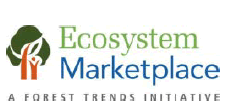Media Contact
Genevieve Bennett
[email protected]

PRESS RELEASE: EMBARGOED UNTIL MARCH 19, 2015 – 10 am EST
19 March 2015 | Washington, D.C. | A new report dispels the myth that companies purchase carbon offsets to “buy their way out” of taking responsibility for their contributions to climate change. Rather, companies that include offset purchases as part of their carbon management strategies are more environmentally proactive than their non-offsetting counterparts, the report found.
Companies ranging from General Motors to Barclays to Brazil-based Natura Cosméticos – and at least 260 other household names – are expanding their environmental protection efforts by investing in projects that reduce emissions outside of their immediate operations, according to The Bottom Line: Taking Stock of the Role of Offsets in Corporate Carbon Strategies. This new report from Forest Trends’ Ecosystem Marketplace analyzes this subset of companies alongside a total of 1,882 corporate climate performance disclosures collected by CDP in 2013 and 2014.
The disclosures reveal that 14% percent of CDP’s corporate respondents practice “offset-inclusive carbon management,” meaning that they are investing in hundreds of unique emissions reduction projects – from forestry in Belize to wind energy in India to clean cookstoves in Zambia – in addition to directly reducing their climate impact through energy efficiency, improved product design and other measures.
“Many voluntary emissions reductions targets only address emissions from direct operations,” says Molly Peters-Stanley, Ecosystem Marketplace Director. “Yet the majority of companies’ climate change impact comes from supply chain emissions or from customers’ product use. This research demonstrates a growing recognition that offsetting is an indispensable tool for companies taking responsibility for these otherwise hard-to-reduce emissions.”
Corporate efforts to mitigate the impact of carbon emissions from their direct operations and supply chains are gaining increasing prominence in the lead-up to the international climate talks that begin on November 30th in Paris, France. Nearly 200 countries will try to reach a new climate agreement that limits global temperature increases to below 2 degrees Celsius.
Offset buyers tracked by CDP spent $41 billion in 2013 to make their buildings and processes more energy efficient, install low-carbon energy, switch to cleaner transportation, design more sustainable products, and engage customers and employees around behavior change.
Offset buyers are five times as likely as non-offset buyers to have an internal price on carbon to drive investment in emissions reductions within their company. Several voluntary buyers, including TD Bank, Aviva, and Microsoft, cover the cost of offsets by charging fees to their business divisions based on their contributions to the company’s overall emissions.
The majority of companies (214) offset emissions voluntarily, compared to 56 CDP-reporting companies that purchased offsets to comply with regulations. Companies based in regions with regulatory carbon pricing programs were more likely to buy carbon offsets, even on a voluntary basis, than companies based in locations without a cap-and-trade system or carbon tax. The European Union, home of the EU Emissions Trading System, hosts the largest number of buyers – both compliance-driven and voluntary – since even companies in unregulated sectors are more familiar with market-based mechanisms for emissions reductions.
Most buyers of offsets are companies headquartered in high-emitting countries in North America and Europe that finance emissions reductions in Latin America, Africa, and Asia. The global leader in buying offsets are the United States (48 companies), followed by Japan (32 companies), the United Kingdom (27 companies), and Australia (16 companies).
Though offsetting is a key aspect of hundreds of companies’ carbon management strategies, these investments do not come close to addressing the full climate impact of doing business. Offset buyers emitted 5.8 billion tonnes of carbon dioxide in 2013 – 4.4 billion tonnes of which were ‘scope 3’ or indirect. Offset purchases by CDP-reporting companies neutralized less than 1% of this total impact (50 million tonnes) – an amount equivalent to closing 13 coal-fired power plants for a year.
____________________________________________________________________________________
This report is publicly available due to support from Donor PROFOR (the World Bank Program on Forests), Sponsors Offsetters and JPMorgan Chase, and Supporter South Pole Group.
Forest Trends Ecosystem Marketplace https://www.forest-trends.org/ecosystem-marketplace/

 Forest Trends Ecosystem Marketplace
Forest Trends Ecosystem Marketplace
https://www.forest-trends.org/ecosystem-marketplace/
Ecosystem Marketplace, an initiative of Forest Trends, is a leading source of news, data, and analytics on markets and payments for ecosystem services such as water quality, carbon sequestration, and biodiversity. Ecosystem Marketplace works through a range of qualitative and quantitative analyses to link practitioners and decision-makers with each other and advises companies, governments and other NGOs on carbon/forest carbon market developments, transparency, social and environmental co-benefits and other mechanisms.
